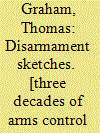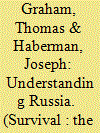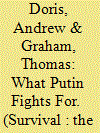| Srl | Item |
| 1 |
ID:
046005


|
|
|
|
|
| Publication |
Seattle, University of Washington Press, 2002.
|
| Description |
xviii, 362p.
|
| Standard Number |
0295982128
|
|
|
|
|
|
|
|
|
|
|
|
Copies: C:1/I:0,R:0,Q:0
Circulation
| Accession# | Call# | Current Location | Status | Policy | Location |
| 047015 | 327.1740973/GRA 047015 | Main | On Shelf | General | |
|
|
|
|
| 2 |
ID:
061067


|
|
|
| 3 |
ID:
095992


|
|
|
|
|
| Publication |
2010.
|
| Summary/Abstract |
At all times the survival of the empire and the maintenance of its territorial integrity were the paramount priorities for Russia's rulers, before which national, religious, economic and other priorities invariably yielded.' So wrote British historian Geoffrey Hosking in his history of the Russian Empire. These priorities remain paramount for Russia's leaders today. During a trip to the Russian Far East in 2008, President Dmitry Medvedev warned that Russia could 'in the end lose everything' quite unexpectedly in the region, pointing to the collapse of the Soviet Union as a cautionary tale. Several years earlier, then President Vladimir Putin voiced similar concerns on a trip to the same region. The Russian Far East has not been the only source of anxiety, however. Putin relaunched a brutal war against separatism and terrorism in Chechnya, which he saw as a grave threat to Russia. Despite official claims of having successfully dealt with Chechnya, escalating violence in the North Caucasus today (particularly in two of Chechnya's immediate neighbours, Ingushetia and Dagestan) is clear evidence of a continuing threat.
|
|
|
|
|
|
|
|
|
|
|
|
|
|
|
|
| 4 |
ID:
067218


|
|
|
| 5 |
ID:
173660


|
|
|
|
|
| Summary/Abstract |
The future is going to be a mixture of competition and cooperation, mainly competition, with much of the cooperation aimed at managing it.
|
|
|
|
|
|
|
|
|
|
|
|
|
|
|
|
| 6 |
ID:
152221


|
|
|
| 7 |
ID:
181194


|
|
|
|
|
| Summary/Abstract |
In Weak Strongman: The Limits of Power in Putin’s Russia, Timothy Frye provides an invaluable antidote to the Western preoccupation with the Russian president. Vladimir Putin, he convincingly argues, operates in a political context that constrains his options as he seeks to maintain indispensable elite support and avoid destabilising popular discontent. Understanding that context is critical, and Frye contends that the best way to do so is to look at other so-called ‘personalist autocracies’, such as Viktor Orbán’s Hungary, Recep Tayyip Erdogan’s Turkey or Nicolás Maduro’s Venezuela. But Frye overstates his case and errs in dismissing the role Russia’s unique history, geography and culture have played in shaping Russian behaviour and Putin’s choices. Indeed, Putin operates within a political tradition whose core features have endured for centuries across multiple regimes. Contrary to Frye, understanding the historical continuity of the Kremlin’s strategic calculus is essential to making sense of Russia today.
|
|
|
|
|
|
|
|
|
|
|
|
|
|
|
|
| 8 |
ID:
186366


|
|
|
|
|
| Summary/Abstract |
Russia’s invasion of Ukraine has reignited debate over the role of NATO expansion in producing the current crisis. Robert Person and Michael McFaul dismiss Russian President Vladimir Putin’s NATO concerns as a ‘fiction’, arguing that it was actually the expansion of democracy that threatened his autocratic regime. This argument draws a false distinction between trends Russians view as deeply entwined. Democracy and NATO expansion were not separate issues for Putin and the Russian elite, but mutually reinforcing elements of a concerted Western effort to contain Russia’s ambitions as a great power. Putin’s distaste for democracy does not overshadow but rather reinforces his objections to NATO. Because NATO expansion played an important role in producing the invasion, halting that expansion might have persuaded Putin to pursue his goals through less violent means.
|
|
|
|
|
|
|
|
|
|
|
|
|
|
|
|